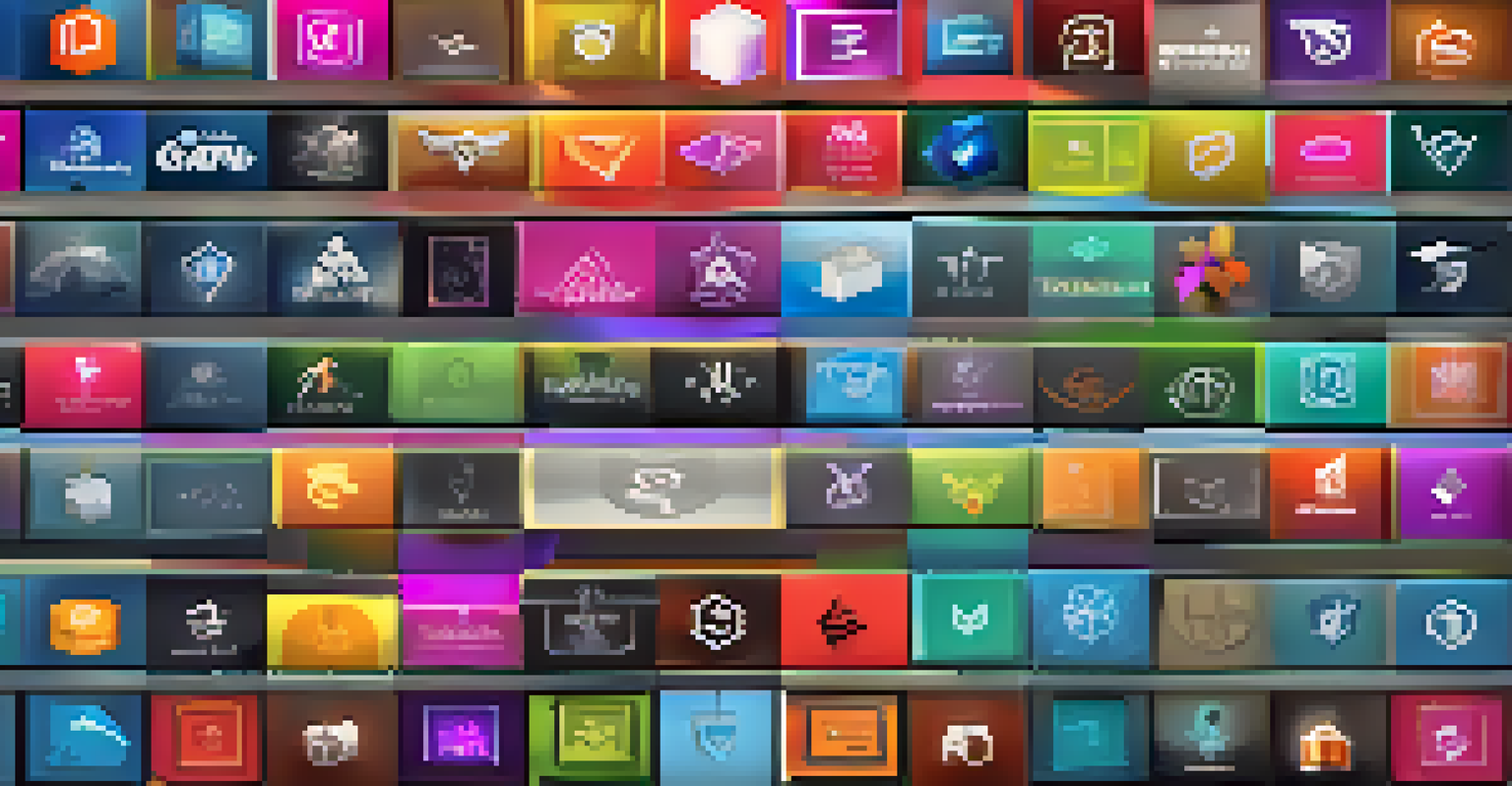An Overview of the Most Popular Game Engines Today

Understanding Game Engines and Their Importance
Game engines are the backbone of modern video game development, providing the necessary tools and frameworks for creating immersive gaming experiences. They streamline complex processes, allowing developers to focus on creativity rather than getting bogged down by technical hurdles. Imagine building a house without a solid foundation; similarly, without a robust game engine, the final product can falter.
Games are a great form of entertainment, but they also provide a great opportunity for creativity and innovation.
These engines enable developers to manage graphics, physics, sound, and even artificial intelligence, all within a unified environment. By using a game engine, teams can collaborate more efficiently, ensuring that every element of the game works harmoniously. Whether it’s a small indie project or a blockbuster title, the right engine can make all the difference.
As gaming technology evolves, so do the expectations of gamers. This necessitates the continuous improvement of game engines to support advanced graphics, realistic physics, and engaging gameplay mechanics. In this article, we’ll explore some of the most popular game engines that are setting the standard in today’s gaming landscape.
Unity: The Versatile Powerhouse for Developers
Unity is one of the most widely used game engines, celebrated for its versatility and user-friendly interface. It caters to both beginners and seasoned developers, allowing them to create 2D and 3D games across multiple platforms, including mobile, console, and PC. Think of Unity as a Swiss Army knife for game development, packed with tools for every task.

One of Unity's standout features is its Asset Store, where developers can find pre-made assets and plugins, significantly speeding up the development process. This community-driven approach fosters creativity and collaboration, as developers share resources and knowledge. Additionally, Unity's robust support for virtual reality (VR) and augmented reality (AR) makes it a go-to choice for cutting-edge projects.
Game Engines: Essential for Development
Game engines provide the foundational tools and frameworks necessary for creating immersive and engaging gaming experiences.
With a strong emphasis on accessibility, Unity offers extensive documentation and tutorials, making it easier for newcomers to jump into game development. Whether you’re creating a simple mobile game or a complex 3D world, Unity provides the flexibility and tools to bring your vision to life.
Unreal Engine: The Leader in High-Fidelity Graphics
Unreal Engine, developed by Epic Games, is renowned for its stunning graphics and realism, making it a favorite among AAA game developers. It uses a visual scripting language called Blueprints, allowing developers to create intricate game mechanics without writing extensive code. This feature makes it more accessible to artists and designers who may not have a programming background.
The best way to predict the future is to create it.
The engine’s powerful rendering capabilities enable developers to create lifelike environments, which is why it’s often the choice for visually demanding games and simulations. For instance, many blockbuster games and cinematic experiences utilize Unreal Engine to achieve that jaw-dropping visual quality that immerses players in the action.
Moreover, Unreal Engine is continually updated with new features and tools, keeping it at the forefront of game development technology. Its community is vibrant and supportive, with plenty of resources available for both learning and problem-solving, ensuring developers can maximize their use of the engine.
Godot: The Open-Source Alternative
Godot has gained traction as a powerful open-source game engine that provides an excellent alternative to proprietary options. Its lightweight design and user-friendly interface make it appealing to indie developers and hobbyists. Picture it as a hidden gem in the game development world, offering rich features without the hassle of licensing fees.
One of Godot's key strengths is its flexibility; it supports a variety of programming languages, including GDScript, C#, and VisualScript. This adaptability allows developers to choose the language they are most comfortable with, making the development process smoother. Additionally, Godot’s scene system enables developers to create complex game structures easily.
Unity: A Top Choice for Developers
Unity's versatility and user-friendly features make it a popular choice among developers for creating diverse games across multiple platforms.
The community surrounding Godot is passionate and supportive, contributing to a growing library of tutorials and resources. As more developers discover its capabilities, Godot continues to evolve, solidifying its place in the competitive game engine landscape.
CryEngine: Pushing the Boundaries of Realism
CryEngine is known for its exceptional graphical fidelity and realistic environments, making it a favorite for developers focused on creating immersive worlds. Games like 'Crysis' have showcased the engine’s ability to produce stunning visuals and detailed landscapes, setting a high bar for competitors. It's like comparing a high-definition movie to a regular one; the difference in quality can be striking.
One of CryEngine's unique features is its real-time lighting and physics systems, which enhance the realism of gameplay. Developers can create dynamic weather systems and day-night cycles that affect gameplay, allowing for a richer player experience. This focus on realism attracts developers who want to create cutting-edge titles that push the envelope.
While CryEngine may have a steeper learning curve than some other engines, its powerful capabilities make it worth the effort. For teams willing to invest the time to master it, CryEngine can deliver breathtaking results and elevate their games to new heights.
GameMaker Studio: Ideal for 2D Game Development
GameMaker Studio is a beloved engine among indie developers, particularly for those focused on 2D game development. Its intuitive drag-and-drop interface allows creators to prototype their ideas quickly, making it accessible for beginners. Think of it as the ideal starting point for aspiring game developers, where creativity can flourish without overwhelming technical barriers.
The engine supports scripting through its own language, GameMaker Language (GML), which provides more control for those looking to dive deeper into programming. This blend of simplicity and depth makes GameMaker Studio a versatile tool for a range of projects, from simple mobile games to more complex indie titles.
Choosing the Right Engine Matters
Selecting the appropriate game engine based on your project's needs can significantly enhance the development process and final product quality.
With a strong community and a wealth of resources available, developers can find ample support while navigating the game creation process. GameMaker Studio has proven itself time and again as a reliable engine for creating charming and engaging 2D experiences.
Amazon Lumberyard: Integrating with Cloud Services
Amazon Lumberyard is an interesting entrant in the game engine market, primarily due to its integration with Amazon Web Services (AWS). This connection allows developers to build games that leverage cloud computing, enhancing multiplayer experiences and game scalability. Imagine having the power of the cloud at your fingertips; this engine opens up new possibilities for game design.
Lumberyard also supports the development of VR and AR games, making it a versatile choice for modern developers. Additionally, its focus on providing tools for creating engaging online experiences sets it apart from more traditional engines. This emphasis on community and player interaction makes it an appealing option for developers looking to create immersive worlds.

While still growing in popularity, Lumberyard's unique features and AWS integration make it a noteworthy contender in the game engine space. As the gaming industry continues to evolve, this engine could play a significant role in shaping future experiences.
Choosing the Right Game Engine for Your Project
Selecting the right game engine can feel like finding a needle in a haystack, given the myriad options available. It’s essential to consider factors like your team’s skill level, the scope of the project, and the type of game you want to create. Each engine has its strengths and weaknesses, so knowing your priorities can help narrow down your choices.
For instance, if you’re aiming for high-end graphics and realism, Unreal Engine or CryEngine might be your best bet. Conversely, if you're a solo developer looking to create a 2D game, GameMaker Studio or Godot could be more suited to your needs. It's like choosing the right tool for a job; the right fit can make the process smoother and more enjoyable.
Ultimately, the best game engine is one that aligns with your vision and resources. By taking the time to research and experiment with different engines, you can find the perfect match to bring your gaming ideas to life.